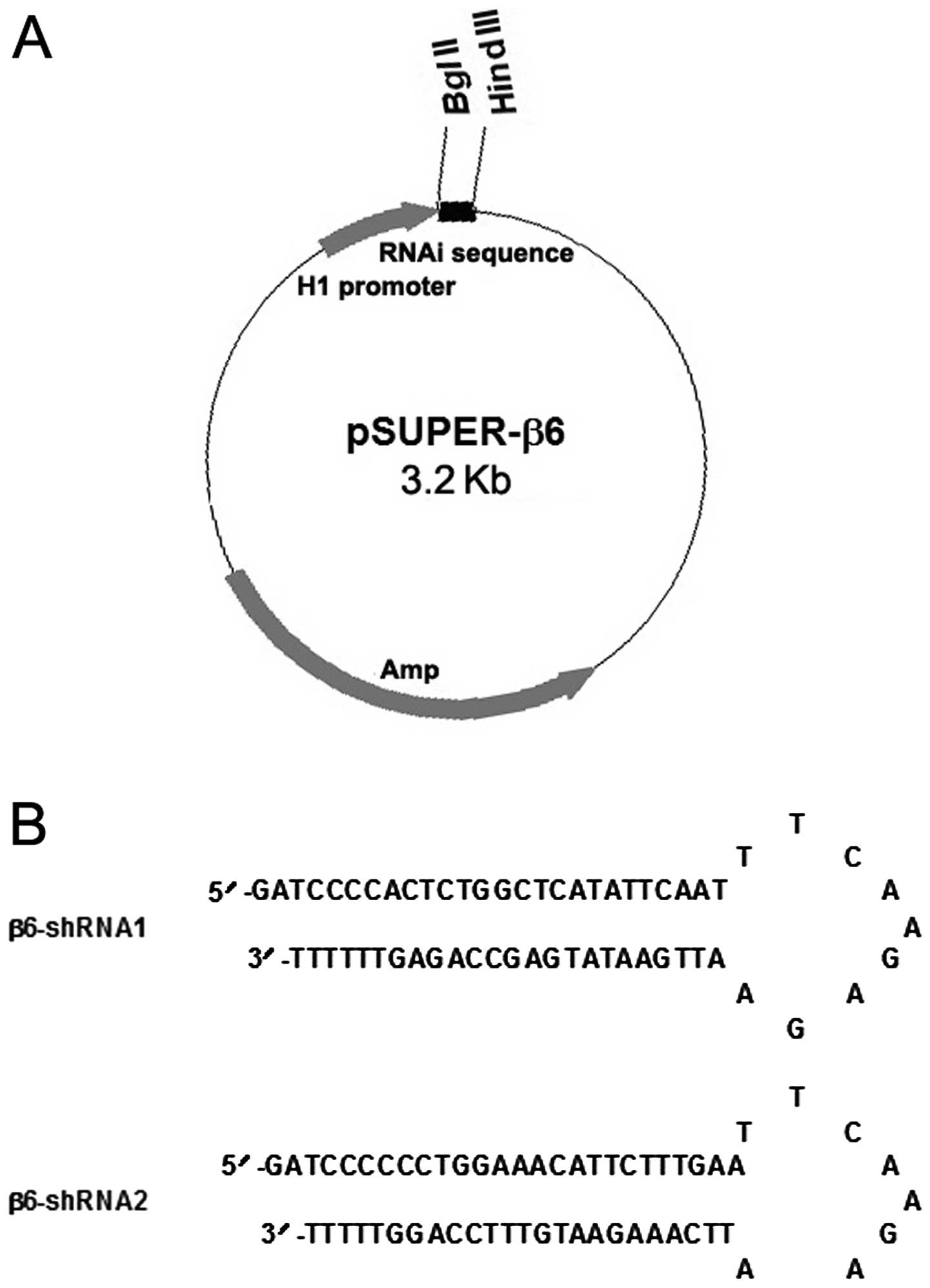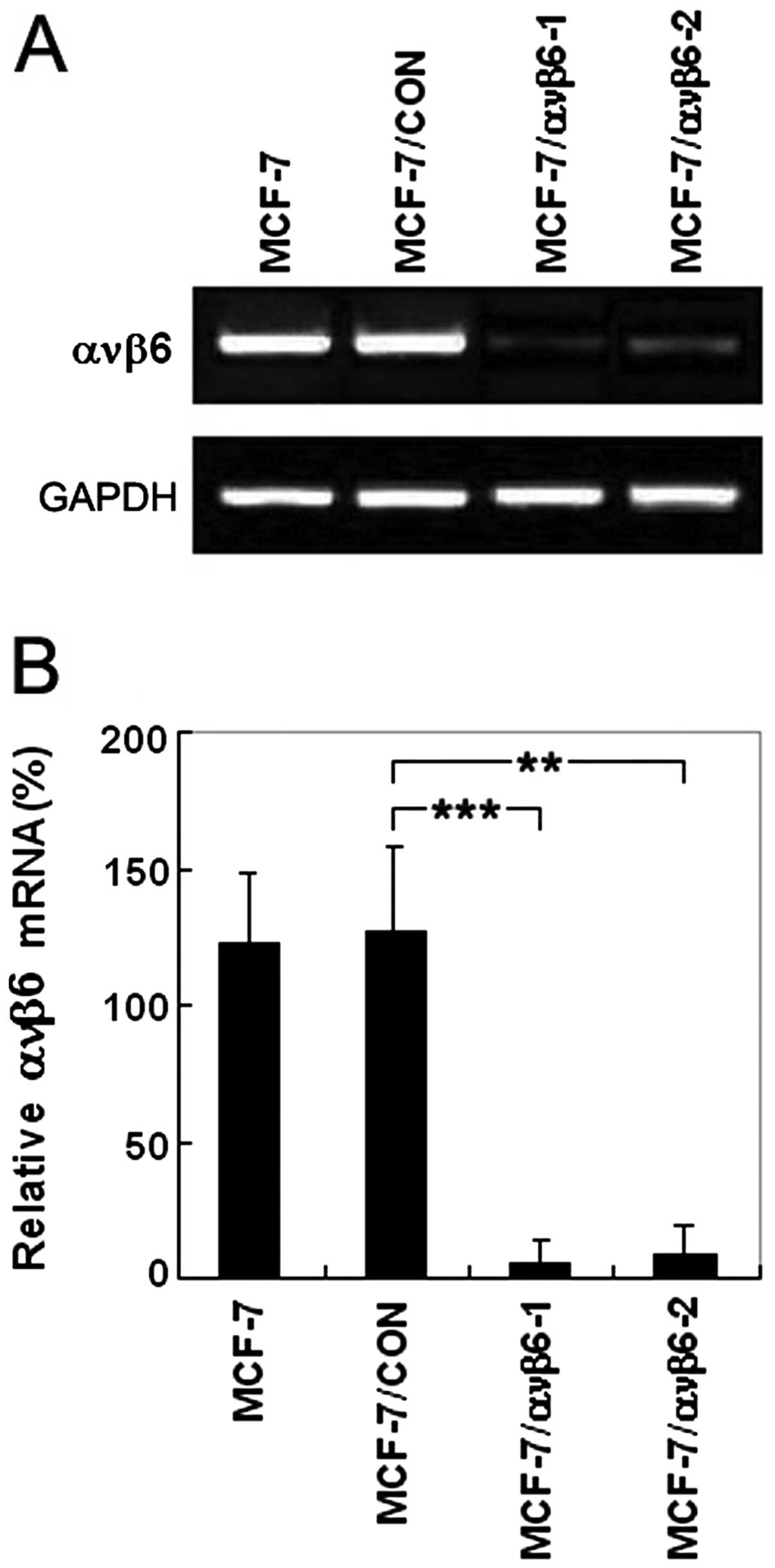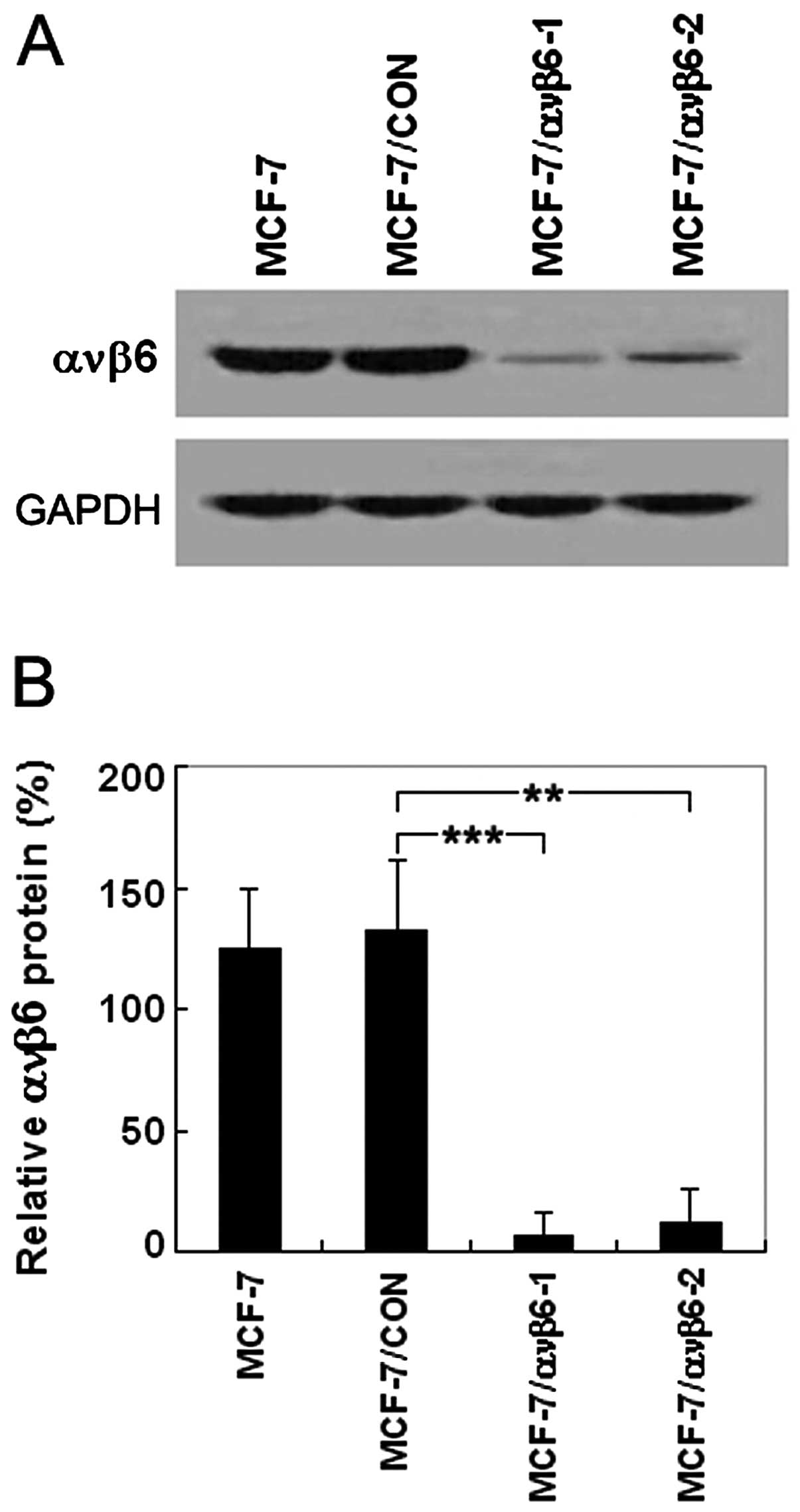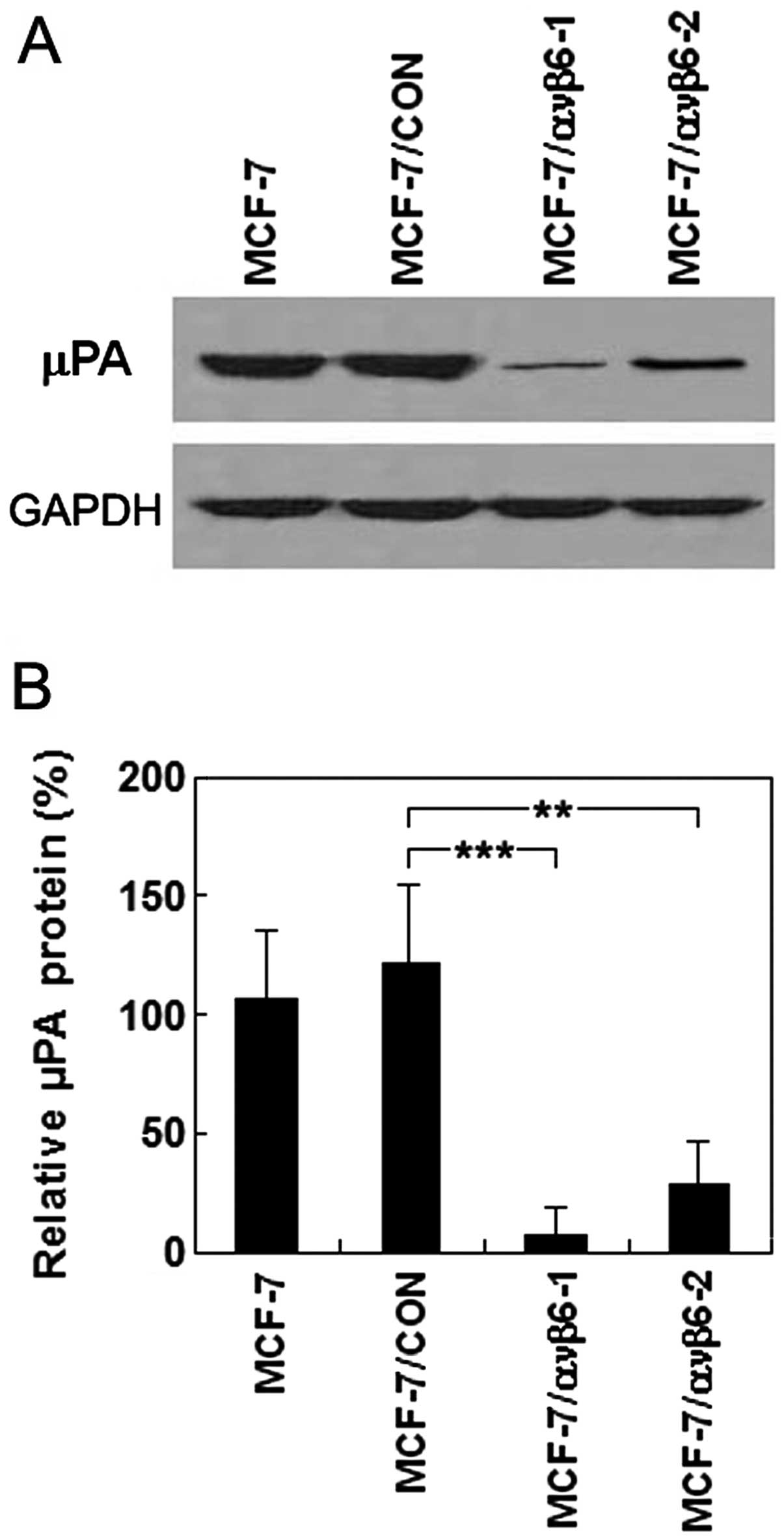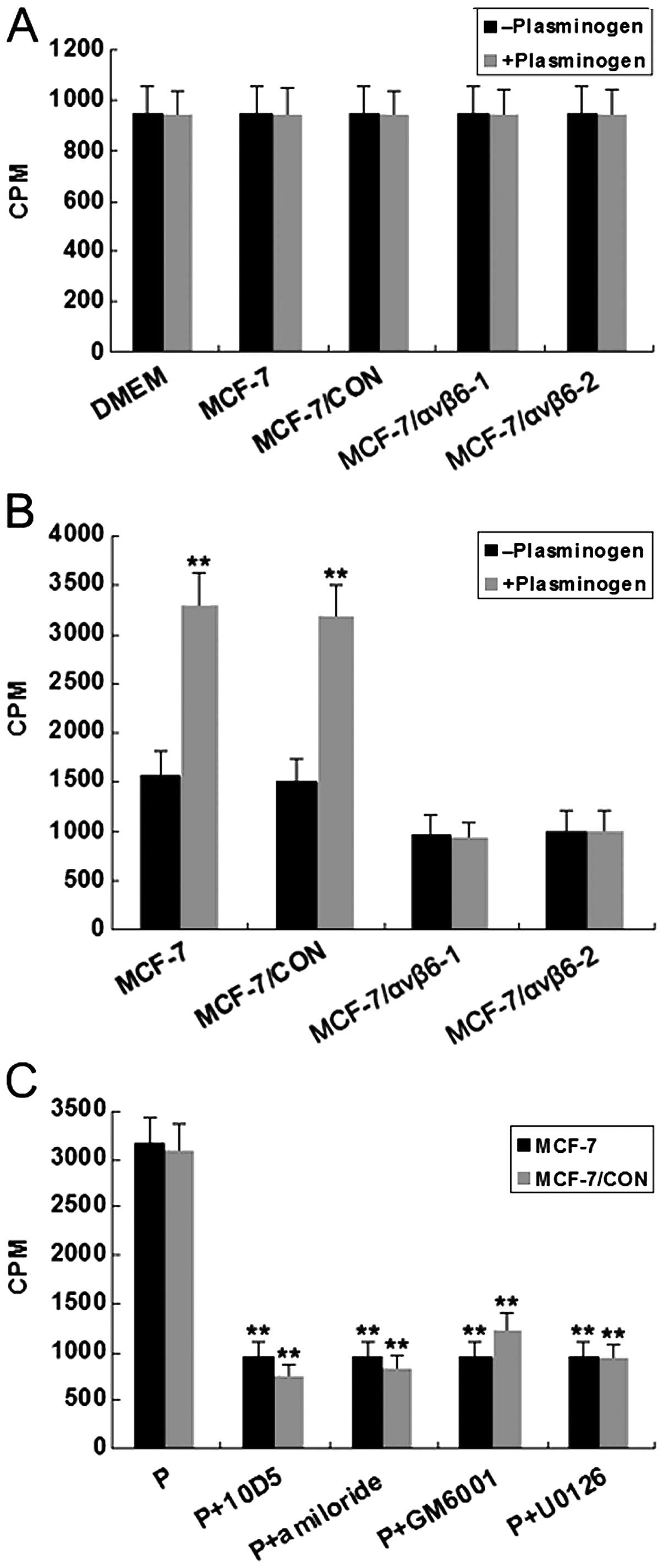|
1
|
Jemal A, Bray F, Center MM, Ferlay J, Ward
E and Forman D: Global cancer statistics. CA Cancer J Clin.
61:69–90. 2011. View Article : Google Scholar
|
|
2
|
Liotta LA and Stetler-Stevenson WG: Tumor
invasion and metastasis: an imbalance of positive and negative
regulation. Cancer Res. 51:S5054–S5059. 1991.PubMed/NCBI
|
|
3
|
Yoon WH, Jung YJ, Kim TD, Li G, Park BJ,
Kim JY, Lee YC, Kim JM, Park JI, Park HD, No ZS, Lim K, Hwang BD
and Kim YS: Gabexate mesilate inhibits colon cancer growth,
invasion, and metastasis by reducing matrix metalloproteinases and
angiogenesis. Clin Cancer Res. 10:4517–4526. 2004. View Article : Google Scholar : PubMed/NCBI
|
|
4
|
McGowan PM and Duffy MJ: Matrix
metalloproteinase expression and outcome in patients with breast
cancer: analysis of a published database. Ann Oncol. 19:1566–1572.
2008. View Article : Google Scholar : PubMed/NCBI
|
|
5
|
Blasi F and Carmeliet P: uPAR: a versatile
signalling orchestrator. Nat Rev Mol Cell Biol. 3:932–943. 2002.
View Article : Google Scholar : PubMed/NCBI
|
|
6
|
Bates RC, Bellovin DI, Brown C, Maynard E,
Wu B, Kawakatsu H, Sheppard D, Oettgen P and Mercurio AM:
Transcriptional activation of integrin beta6 during the
epithelial-mesenchymal transition defines a novel prognostic
indicator of aggressive colon carcinoma. J Clin Invest.
115:339–347. 2005. View Article : Google Scholar
|
|
7
|
Breuss JM, Gallo J, De Lisser HM,
Klimanskaya IV, Folkesson HG, Pittet JF, Nishimura SL, Aldape K,
Landers DV and Carpenter W: Expression of the beta 6 integrin in
development, neoplasia and tissue repair suggests a role in
epithelial remodelling. J Cell Sci. 108:2241–2251. 1995.PubMed/NCBI
|
|
8
|
Niu J, Gu X, Ahmed N, Andrews S, Turton J,
Bates R and Agrez M: The alphaVbeta6 integrin regulates its own
expression with cell crowding: Implications for tumour progression.
Int J Cancer. 1:40–48. 2001. View Article : Google Scholar : PubMed/NCBI
|
|
9
|
Arihiro K, Kaneko M, Fujii S, Inai K and
Yokosaki Y: Significance of alpha 9 beta 1 and alpha v beta 6
integrin expression in breast carcinoma. Breast Cancer. 7:19–26.
2000. View Article : Google Scholar : PubMed/NCBI
|
|
10
|
Azare J, Leslie K, Al-Ahmadie H, Gerald W,
Weinreb PH, Violette SM and Bromberg J: Constitutively activated
Stat3 induces tumorigenesis and enhances cell motility of prostate
epithelial cells through integrin beta 6. Mol Cell Biol.
27:4444–4453. 2007. View Article : Google Scholar
|
|
11
|
Hausner SH, Abbey CK, Bold RJ, Gagnon MK,
Marik J, Marshall JF, Stanecki CE and Sutcliffe JL: Targeted in
vivo imaging of integrin alphavbeta6 with an improved radiotracer
and its relevance in a pancreatic tumor model. Cancer Res.
69:5843–5850. 2009. View Article : Google Scholar : PubMed/NCBI
|
|
12
|
Hazelbag S, Kenter GG, Gorter A, Dreef EJ,
Koopman LA, Violette SM, Weinreb PH and Fleuren GJ: Overexpression
of the alpha v beta 6 integrin in cervical squamous cell carcinoma
is a prognostic factor for decreased survival. J Pathol.
212:316–324. 2007. View Article : Google Scholar : PubMed/NCBI
|
|
13
|
Eberlein C, Kendrew J, McDaid K, Alfred A,
Kang JS, Jacobs VN, Ross SJ, Rooney C, Smith NR, Rinkenberger J,
Cao A, Churchman A, Marshall JF, Weir HM, Bedian V, Blakey DC,
Foltz IN and Barry ST: A human monoclonal antibody 264RAD targeting
αvβ6 integrin reduces tumour growth and metastasis, and modulates
key biomarkers in vivo. Oncogene. 32:4406–4416. 2013.
|
|
14
|
Allen MD, Thomas GJ, Clark SE, Dawoud MM,
Vallath S, Payne SJ, Gomm JJ, Dreger SA, Dickinson S, Edwards DR,
Pennington CJ, Sestak I, Cuzick J, Marshall JF, Hart IR and Jones
JL: Altered microenvironment promotes progression of pre-invasive
breast cancer: myoepithelial expression of αvβ6 integrin in DCIS
identifies high-risk patients and predicts recurrence. Clin Cancer
Res. 20:344–357. 2014.PubMed/NCBI
|
|
15
|
Kundu P, Mukhopadhyay AK, Patra R,
Banerjee A, Berg DE and Swarnakar S: Cag pathogenicity
island-independent up-regulation of matrix metalloproteinases-9 and
-2 secretion and expression in mice by Helicobacter pylori
infection. J Biol Chem. 281:34651–34662. 2006. View Article : Google Scholar : PubMed/NCBI
|
|
16
|
Niu J, Dorahy DJ, Gu X, Scott RJ, Draganic
B, Ahmed N and Agrez MV: Integrin expression in colon cancer cells
is regulated by the cytoplasmic domain of the beta6 integrin
subunit. Int J Cancer. 99:529–537. 2002. View Article : Google Scholar : PubMed/NCBI
|
|
17
|
Agrez M, Gu X, Turton J, Meldrum C, Niu J,
Antalis T and Howard EW: The alpha v beta 6 integrin induces
gelatinase B secretion in colon cancer cells. Int J Cancer.
81:90–97. 1999. View Article : Google Scholar : PubMed/NCBI
|
|
18
|
Kähäri VM and Saarialho-Kere U: Matrix
metalloproteinases and their inhibitors in tumour growth and
invasion. Ann Med. 31:34–45. 1999.PubMed/NCBI
|
|
19
|
Burkhardt BR, Lyle R, Qian K, Arnold AS,
Cheng H, Atkinson MA and Zhang YC: Efficient delivery of siRNA into
cytokine-stimulated insulinoma cells silences Fas expression and
inhibits Fas-mediated apoptosis. FEBS Lett. 580:553–560. 2006.
View Article : Google Scholar
|
|
20
|
Chu CY and Rana TM: Potent RNAi by short
RNA triggers. RNA. 14:1714–1719. 2008. View Article : Google Scholar : PubMed/NCBI
|
|
21
|
Mungall BA, Schopman NC, Lambeth LS and
Doran TJ: Inhibition of Henipavirus infection by RNA interference.
Antiviral Res. 80:324–331. 2008. View Article : Google Scholar : PubMed/NCBI
|
|
22
|
Devi GR: siRNA-based approaches in cancer
therapy. Cancer Gene Ther. 13:819–829. 2006. View Article : Google Scholar : PubMed/NCBI
|
|
23
|
Delgado R and Regueiro BJ: The future of
HIV infection: gene therapy and RNA interference. Enferm Infecc
Microbiol Clin. 23:76–83. 2005. View Article : Google Scholar
|
|
24
|
Chen Y, Chen H, Hoffmann A, Cool DR, Diz
DI, Chappell MC, Chen AF and Morris M: Adenovirus-mediated
small-interference RNA for in vivo silencing of angiotensin AT1a
receptors in mouse brain. Hypertension. 47:145–146. 2006.
View Article : Google Scholar : PubMed/NCBI
|
|
25
|
Matters GL, Harms JF, McGovern CO,
Jayakumar C, Crepin K, Smith ZP, Nelson MC, Stock H, Fenn CW,
Kaiser J, Kester M and Smith JP: Growth of human pancreatic cancer
is inhibited by down-regulation of gastrin gene expression.
Pancreas. 38:151–161. 2009. View Article : Google Scholar : PubMed/NCBI
|
|
26
|
Stein U, Walther W, Stege A, Kaszubiak A,
Fichtner I and Lage H: Complete in vivo reversal of the multidrug
resistance phenotype by jet-injection of anti-MDR1 short hairpin
RNA-encoding plasmid DNA. Mol Ther. 16:178–186. 2008. View Article : Google Scholar : PubMed/NCBI
|
|
27
|
Brummelkamp TR, Bernards R and Agami R: A
system for stable expression of short interfering RNAs in mammalian
cells. Science. 296:550–553. 2002. View Article : Google Scholar : PubMed/NCBI
|
|
28
|
Agrez M, Chen A, Cone RI, Pytela R and
Sheppard D: The alpha v beta 6 integrin promotes proliferation of
colon carcinoma cells through a unique region of the beta 6
cytoplasmic domain. J Cell Biol. 127:547–556. 1994. View Article : Google Scholar : PubMed/NCBI
|
|
29
|
Cassoni P, Marrocco T, Bussolati B, Allia
E, Munaron L, Sapino A and Bussolati G: Oxytocin induces
proliferation and migration in immortalized human dermal
microvascular endothelial cells and human breast tumor-derived
endothelial cells. Mol Cancer Res. 4:351–359. 2006. View Article : Google Scholar
|
|
30
|
Egeblad M and Werb Z: New functions for
the matrix metalloproteinases in cancer progression. Nat Rev
Cancer. 2:161–174. 2002. View
Article : Google Scholar : PubMed/NCBI
|
|
31
|
Gu X, Niu J, Dorahy DJ, Scott R and Agrez
MV: Integrin alpha(v) beta6-associated ERK2 mediates MMP-9
secretion in colon cancer cells. Br J Cancer. 87:348–351. 2002.
View Article : Google Scholar : PubMed/NCBI
|
|
32
|
Godier A and Hunt BJ: Plasminogen
receptors and their role in the pathogenesis of inflammatory,
autoimmune and malignant disease. J Thromb Haemost. 11:26–34. 2013.
View Article : Google Scholar : PubMed/NCBI
|
|
33
|
Ahmed N, Oliva K, Wang Y, Quinn M and Rice
G: Downregulation of urokinase plasminogen activator receptor
expression inhibits Erk signalling with concomitant suppression of
invasiveness due to loss of uPAR-beta1 integrin complex in colon
cancer cells. Br J Cancer. 89:374–384. 2003. View Article : Google Scholar
|
|
34
|
Zhang W and Liu HT: MAPK signal pathways
in the regulation of cell proliferation in mammalian cells. Cell
Res. 12:9–18. 2002. View Article : Google Scholar : PubMed/NCBI
|
|
35
|
Koul HK, Pal1 M and Koul S: Role of p38
MAP Kinase signal transduction in solid tumors. Genes Cancer.
4:11–12. 2013.PubMed/NCBI
|
|
36
|
Edick MJ, Tesfay L, Lamb LE, Knudsen BS
and Miranti CK: Inhibition of integrin-mediated crosstalk with
epidermal growth factor receptor/Erk or Src signaling pathways in
autophagic prostate epithelial cells induces caspase-independent
death. Mol Biol Cell. 18:2481–2490. 2007. View Article : Google Scholar
|
|
37
|
Ahmed N, Niu J, Dorahy DJ, Gu XH, Andrews
S, Meldrum CJ, Scott RJ, Baker MS, Macreadie IG and Agrez MV:
Direct integrin alphavbeta6-ERK binding: implications for tumour
growth. Oncogene. 21:1370–1380. 2002. View Article : Google Scholar : PubMed/NCBI
|















